
The Heliantheae are the third-largest tribe in the sunflower family (Asteraceae). With some 190 genera and nearly 2500 recognized species, only the tribes Senecioneae and Astereae are larger. The name is derived from the genus Helianthus, which is Greek for sun flower. Most genera and species are found in North America and South America. A few genera are pantropical.

The Gnaphalieae are a tribe of flowering plants in the family Asteraceae. It is most closely related to the tribes Anthemideae, Astereae, and Calenduleae.

Eupatorieae is a tribe of over 2000 species of plants in the family Asteraceae. Most of the species are native to tropical, subtropical, and warm temperate areas of the Americas, but some are found elsewhere. Well-known members are Stevia rebaudiana, a number of medicinal plants (Eupatorium), and a variety of late summer to autumn blooming garden flowers, including Ageratum (flossflower), Conoclinium (mistflower), and Liatris.

Tageteae is a tribe of the plant family Asteraceae. It consists of approximately 260 species divided among 32 genera. All are found in the New World, with a center of diversity in the Mexican highlands. The type genus is Tagetes (marigolds).
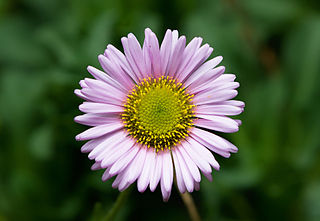
Astereae is a tribe of plants in the family Asteraceae that includes annuals, biennials, perennials, subshrubs, shrubs, and trees. They are found primarily in temperate regions of the world. Plants within the tribe are present nearly worldwide divided into over 250 genera and more than 3,100 species, making it the second-largest tribe in the family behind Senecioneae.

Munnozia is a genus of flowering plants in the family Asteraceae. It is centered in the Andes.

Mutisia is a genus of flowering plant in the tribe Mutisieae within the family Asteraceae. Mutisia has been named after José Celestino Mutis. It comprises about sixty species which can be found along the entire length of the Andes and in southern Brazil, Paraguay, Uruguay and northern Argentina.

The Mutisioideae are a subfamily in the plant family Asteraceae that includes about 630 species assigned to 44 different genera. This subfamily is mainly native in South America, except for Adenocaulon, Chaptalia, Gerbera, Trichocline, which have species in all continents other than Europe and Antarctica. Common characters are the deeply incised corollas of the disc florets, with five lobes, sometimes merged in two lips, flower heads with overlapping involucral bracts, anthers with tails and pointy tips, the styles usually stick far out of the florets and are essentially hairless. Most species are herbs, but some are vines, shrubs, or small trees.

The Cichorioideae are a subfamily of the family Asteraceae of flowering plants. Familiar members of Cichorioideae include lettuce, dandelions, chicory and Gazania species. The subfamily comprises about 240 genera and about 2900 species. It is heterogeneous and hard to characterize except with molecular characters.

Anthemideae is a tribe of flowering plants in the family, Asteraceae, and the subfamily Asteroideae. They are distributed worldwide with concentrations in central Asia, the Mediterranean Basin, and southern Africa. Most species of plant known as chamomile belong to genera of this tribe.

Madieae is a tribe of flowering plants in the family Asteraceae. It is sometimes considered a subtribe of Heliantheae. Notable species include the tarweeds of the Western United States as well as the silverswords of Hawaii.
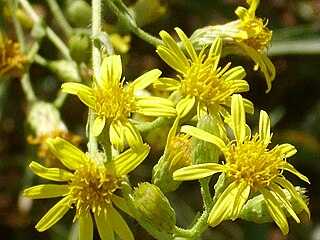
Inuleae is a tribe of flowering plants in the subfamily Asteroideae.
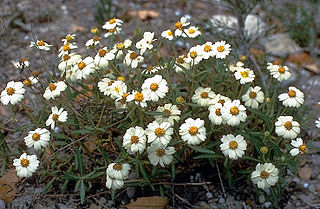
Millerieae is a tribe of flowering plants belonging to the Asteroideae subfamily. Of all the genera, only Galinsoga, Guizotia, and Sigesbeckia have species native to the Old World.
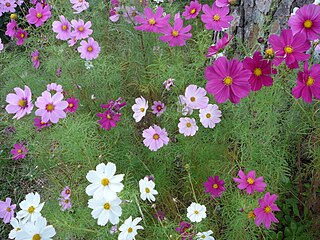
Coreopsideae is a tribe of flowering plants belonging to the Asteroideae subfamily. It includes widely cultivated genera such as Cosmos and Dahlia.
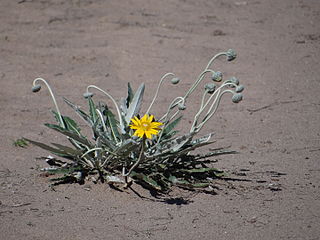
Trichocline is a genus of Australian and South American plants in the tribe Mutisieae within the family Asteraceae. It consists of one species from Australia (T. spathulata) and twenty-three from South America.
Pachylaena is a genus of South American flowering plants in the tribe Mutisieae within the family Asteraceae.

Helenieae is a tribe of the plant family Asteraceae. The type genus is Helenium, but the best known members of the tribe are the Gaillardia. Helenieae are usually placed in their own tribe, but some authors include this and several other tribes as subtribes within a broader definition of the tribe Heliantheae.

Leucheria is a genus of flowering plants in the family Asteraceae.

The Onoserideae are a tribe of flowering plants in the family Asteraceae.

The Nassauvieae are a tribe of flowering plants in the family Asteraceae.


















